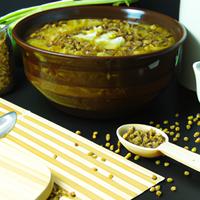
1 serving (250 grams) contains 150 calories, 10.0 grams of protein, 2.0 grams of fat, and 30.0 grams of carbohydrates.

Log this food in SnapCalorie

Nutrition Information
Calories |
141.5 | ||
|---|---|---|---|
% Daily Value* |
|||
| Total Fat | 1.9 g | 2% | |
| Saturated Fat | 0.5 g | 2% | |
| Polyunsaturated Fat | 0 g | ||
| Cholesterol | 0 mg | 0% | |
| Sodium | 377.4 mg | 16% | |
| Total Carbohydrates | 28.3 g | 10% | |
| Dietary Fiber | 7.5 g | 26% | |
| Sugars | 2.8 g | ||
| protein | 9.4 g | 18% | |
| Vitamin D | 0 mcg | 0% | |
| Calcium | 47.2 mg | 3% | |
| Iron | 1.9 mg | 10% | |
| Potassium | 283.0 mg | 6% | |
* Percent Daily Values are based on a 2,000 calorie diet. Your daily values may be higher or lower depending on your calorie needs.
Food Attributes
Source of Calories
About Mung beans soup
Mung Bean Soup is a nourishing dish popular in many Asian cuisines, particularly in Filipino, Indian, and Chinese traditions. Made from mung beans, the soup may include ingredients such as garlic, onion, tomatoes, coconut milk, and occasionally meat or seafood for added flavor. This dish is known for its earthy, mildly sweet taste and velvety texture. Mung beans are high in dietary fiber, plant-based protein, and essential nutrients like magnesium, potassium, and folate, making this soup excellent for digestion, heart health, and sustained energy. Often vegan-friendly, it can be adapted to suit various dietary preferences. However, additions like coconut milk and fatty meats can increase its calorie and fat content, so these should be considered depending on dietary goals. Mung Bean Soup pairs wholesomeness with versatility, making it a comforting and nutritious choice for many.



